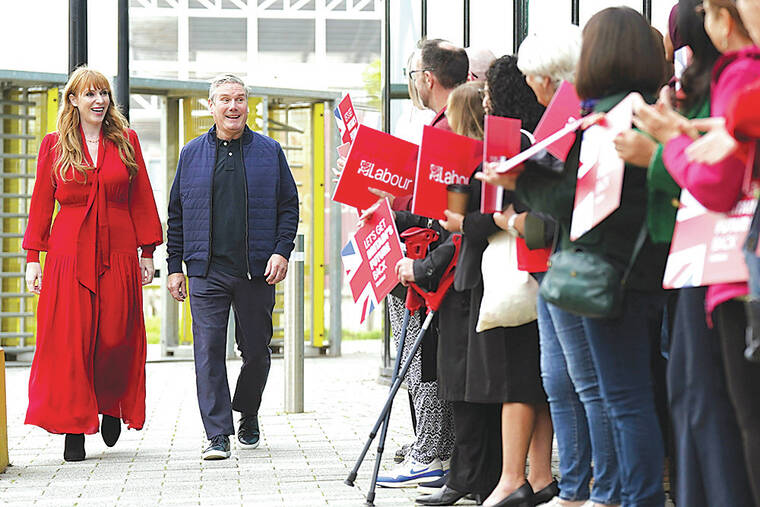After years in opposition, Britain’s Labour Party senses it’s on the verge of regaining power
LONDON — Members of Britain’s opposition Labour Party gather in Liverpool on Sunday for their annual conference with an unfamiliar feeling: optimism.
The party has been out of power for 13 years, and in the last national election in 2019, voters handed Labour its worst drubbing since 1935. But with an election due next year, polls put Labour as much as 20 points ahead of the governing Conservative Party, and Labour scored a morale-boosting special election victory in Scotland last week.
Power is within the party’s grasp — as long as it doesn’t mess things up.
“It was a big step in the right direction, an important one,” Labour leader Keir Starmer said Friday after the special election result. “But we accept this humbly. This is a step on the journey.”
Labour’s landslide 1997 election victory under Tony Blair — the peak of its popularity — was a quarter-century ago, and the party has suffered four straight election defeats.
The Conservatives have been in power nationally since 2010, years that saw austerity following the world banking crisis, Britain’s divisive decision to leave the European Union, a global pandemic and a European war that has triggered the worst cost-of-living crisis in decades.
Those upheavals left both Britain’s main parties in turmoil — and both responded by picking populist leaders. Labour members elected the veteran left-wing lawmaker Jeremy Corbyn in 2015. The Conservatives, after years of division and wrangling over the country’s EU exit, chose brash Brexit-booster Boris Johnson and won a thumping election victory over Corbyn in 2019.
Corbyn quit after that defeat, and amid criticism that he’d allowed antisemitism to fester in a party that sees itself as proudly antiracist.
Starmer won a party leadership contest in 2020, vowing to restore relations between the party and the Jewish community. He also has steered the social democratic party back toward the political middle-ground after the divisive tenure of Corbyn, a staunch socialist who advocated nationalization of key industries and infrastructure.
Starmer’s actions angered some grassroots Labour members who want a bolder agenda, but it has revived the party’s poll ratings. In a sign that corporate Britain is preparing for a change of government, Labour says companies have been queuing up to buy stands in the conference exhibition hall and to attend a business forum with Starmer and other senior party leaders.
In a speech opening the gathering, Deputy Leader Angela Rayner accused the Conservatives of presiding over “national decline” and being too consumed with internal political chaos to sort out the country’s problems.
“Rishi Sunak and his party have taken a sledgehammer to the foundations on which a good life can be built,” she said. “And now the simple things in life are crumbling: a decent job, a secure, affordable home and a strong community.”
The party has to walk a delicate line to convince voters it can ease the U.K.’s chronic housing crisis and repair its fraying public services, especially the creaking, overburdened state-funded National Health Service – but without imposing tax increases on the public.


